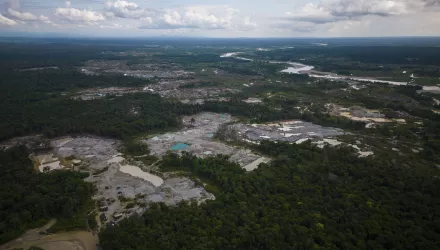East Timor, once viewed as a U.N. success story because the world body had backed an Australian intervention to rescue the impoverished island from the grips of the Indonesian army, has become beset by poverty and civil turmoil.
The latest rioting, which forced more than 100,000 people from their homes, had nothing to do with the Indonesian army, which had occupied the tiny island for 27 years. This time it was rival gangs of desperate young men, aided and abetted by members of East Timor's army, that burned down buildings and attacked each other with machetes.
How did this come about?
In 1999, recognizing that years of neglect had left East Timor the poorest country in Asia, the United Nations set up an international protectorate to guide the country until it achieved independence. But two mistakes were made that are coming back to haunt them.
The first was to leave many of those who fought for independence from Indonesia to hang out to dry in the new East Timor. A key lesson for maintaining peace after armed conflict is that the victorious rebel army must be demobilized, disarmed and reintegrated into society, usually by transforming it into army and police forces.
In February 2001, members of Falintil, the armed wing of the East Timor independence movement, were incorporated primarily into the Timor Leste Defense Force (FDTL) and, to a lesser extent, into the National Police of Timor Leste (PNTL). But this process was left unfinished in two ways.
First, because there were more Falintil fighters than jobs in the army or police, unemployment skyrocketed among those who had fought for independence. Some ex-Falintil joined veterans associations to express their discontent with the government. But most were not reintegrated into society.
Second, despite the insistence of donor countries (such as Australia and the U.S.) that the security services remain out of politics, both the army and police became increasingly politicized. Aside from their complaints about low pay and a lack of work, members of the army regularly criticized Prime Minister Mari Alkatiri for nepotism and corruption.
During protests of a controversial law banning religious education in May 2005, rumors swirled of an army coup attempt against the government. The police — against whom there were regular charges of torture, beatings and arbitrary detention — enjoyed close relations with the Alkatiri government.
In deference to the independent government established in 2002, the United Nations stayed silent about the growing politicization of security services.
In February, more than one-fourth of the army resigned in protest over allegations of nepotism and injustice in promotions. The government fired over 600 soldiers in March for desertion, and Mr. Alkatiri sent the police against the army. The result was clashes between the army and police last month.
At the same time, the United Nations failed to get East Timor's fragile economy on its feet. According to the government, over half of the aid sent to East Timor during the U.N. tenure went to pay the salaries and consultant fees of foreigners. Such an infusion of cash created a bubble economy in East Timor, which largely was dependent on restaurants, bars and services for the foreigners. This economic recovery of sorts was sustainable so long as the U.N. stayed in the country. But the bubble burst when the United Nations began to depart in late 2004, with thousands being put out of work in Dili alone. A recent World Bank study revealed that East Timor experienced a reversal in economic growth since independence. Over 63 percent of the population lives on less than $2 a day, and unemployment hovers at about 50 percent.
As East Timor's fortunes rapidly declined, street crime became endemic and gang violence became common. When the standoff between the army and the police escalated into violence a few weeks ago, many of these poor and embittered gangs saw their opportunity to settle scores with each other and to rob those who remained on the sidelines. Because East Timor remains divided between those who supported independence and those who did not, there was a readymade political justification for these gangs to cause mayhem in Dili and elsewhere.
The United Nations may bear some responsibility for the chaos in East Timor, but it also is part of the solution. There are signs that East Timor may be emerging from this crisis; Australia's decision to deploy 1,300 troops will be essential in disarming the militias and gangs.
East Timor's enormously popular President Xanana Gusmao also has taken the right step in firing the ministers in charge of the army and police and assuming direct control over both organizations. But the United Nations is needed to finish the job by reintegrating Falintil into society and ensuring that the local economy is built on a durable foundation.
If this crisis passes without a renewed long-term U.N. commitment to taming the police and security forces and to building a sustainable local economy, East Timor's future will remain grim.
Michael J. Boyle is a postdoctoral fellow at the Belfer Center for Science and International Affairs at Harvard's Kennedy School of Government. His e-mail is michael_boyle@ksg.harvard.edu.
Boyle, Michael. “Finish Job in East Timor.” Baltimore Sun, June 6, 2006





